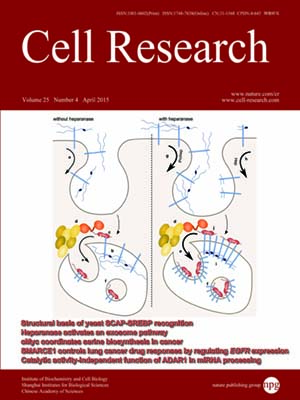
Volume 25, No 4, Apr 2015
ISSN: 1001-0602
EISSN: 1748-7838 2018
impact factor 17.848*
(Clarivate Analytics, 2019)
Volume 25 Issue 4, April 2015: 429-444
ORIGINAL ARTICLES
cMyc-mediated activation of serine biosynthesis pathway is critical for cancer progression under nutrient deprivation conditions
Linchong Sun1,*, Libing Song2,*, Qianfen Wan3, Gongwei Wu1, Xinghua Li2, Yinghui Wang1, Jin Wang3, Zhaoji Liu1, Xiuying Zhong1, Xiaoping He1, Shengqi Shen1, Xin Pan4, Ailing Li4, Yulan Wang3,5, Ping Gao1, Huiru Tang3,6 and Huafeng Zhang1
1CAS Key Laboratory of Innate Immunity and Chronic Disease, Innovation Center for Cell Signaling Network, School of Life Science, University of Science and Technology of China, Hefei, Anhui 230027, China
2State Key Laboratory of Oncology in Southern China and Departments of Experimental Research, Sun Yat-sen University Cancer Center, Guangzhou, Guangdong 510060, China
3CAS Key Laboratory of Magnetic Resonance in Biological Systems, Wuhan Institute of Physics and Mathematics, Chinese Academy of Sciences, Wuhan, Hubei 430071, China
4State Key Laboratory of Proteomics, China National Center of Biomedical Analysis, Beijing 100850, China
5Collaborative Innovation Center for Diagnosis and Treatment of Infectious Diseases, Zhejiang University, Hangzhou, Zhejiang 310058, China
6State Key Laboratory of Genetic Engineering, Collaborative Innovation Center for Genetics and Development, Fudan University, Shanghai 200433, China
Correspondence: Huafeng Zhang; Huiru Tang; Ping Gao(hzhang22@ustc.edu.cn; Huiru_tang@fudan.edu.cn; pgao2@ustc.edu.cn)
Cancer cells are known to undergo metabolic reprogramming to sustain survival and rapid proliferation, however, it remains to be fully elucidated how oncogenic lesions coordinate the metabolic switch under various stressed conditions. Here we show that deprivation of glucose or glutamine, two major nutrition sources for cancer cells, dramatically activated serine biosynthesis pathway (SSP) that was accompanied by elevated cMyc expression. We further identified that cMyc stimulated SSP activation by transcriptionally upregulating expression of multiple SSP enzymes. Moreover, we demonstrated that SSP activation facilitated by cMyc led to elevated glutathione (GSH) production, cell cycle progression and nucleic acid synthesis, which are essential for cell survival and proliferation especially under nutrient-deprived conditions. We further uncovered that phosphoserine phosphatase (PSPH), the final rate-limiting enzyme of the SSP pathway, is critical for cMyc-driven cancer progression both in vitro and in vivo, and importantly, aberrant expression of PSPH is highly correlated with mortality in hepatocellular carcinoma (HCC) patients, suggesting a potential causal relation between this cMyc-regulated enzyme, or SSP activation in general, and cancer development. Taken together, our results reveal that aberrant expression of cMyc leads to the enhanced SSP activation, an essential part of metabolic switch, to facilitate cancer progression under nutrient-deprived conditions.
10.1038/cr.2015.33
FULL TEXT | PDF
Browse 3425


